Interdisciplinary PhD Research and Travel Fund
The Graduate School for Interdisciplinary Studies (GSIS) offers up to 12 awards to interdisciplinary PhD students to support them in an interdisciplinary activity to help further their postgraduate (PG) research. With applications now open for 2025, PhD students currently supervised by more than one School are encouraged to take full advantage of this opportunity, and can apply using our Graduate School Interdisciplinary PhD Research Fund Application Form. If you are interested in how this fund could potentially help support your PG research, read about the highlights of last year’s cohorts and their experiences below.
-
Riane McConnell
Doctoral Student in Hebrew Bible/Old Testament
This summer I was afforded the opportunity to attend and present at the 2024 EABS (European Association of Biblical Studies) conference in Sofia, Bulgaria. EABS is a wonderfully diverse meeting of scholars across several disciplines, backgrounds, and research areas. Currently, I have started my second year as a Hebrew Bible/Old Testament divinity student at St. Andrews. My research explores intertextual connections between legal texts and the characterization of women in the Hebrew Bible.EABS was an incredibly helpful experience as I became acquainted with the broader field of biblical studies in a European context. At this conference, I was privileged to present a paper entitled The Unnamed Messenger: The Literary Functions of the Mal’ak in Pentateuchal Narratives. During the session that I presented in, my paper was accompanied by other influential work in the field of poetics, theory, and biblical interpretation. The feedback I was able to gain from this paper gave insight to my methodological endeavors. While the paper I presented was tangential to my current research, it overlaps in method. Questions were asked about a multiplicity of relevant areas such as: character analyses, lexeme definitions and ambiguities, and the development of various narratives across the Pentateuch and Hebrew Bible. I was encouraged to explore publishing my paper with a biblical journal, too.
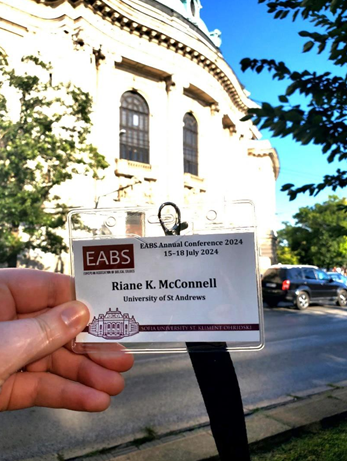
Outside of my paper presentation, I attended session on relevant secondary fields of research: Perspectives on the Reception of the Bible, Prophets and Prophecy, Representation of Cultural Trauma in the Hebrew Bible, Emotions in the Biblical World, and Anthropology and the Bible. These sections expanded have served as catalysts for my current research. I gained insight on deictic word studies (i.e., word studies that demonstrate progressive meaning throughout a literary corpus), deepening the characterization of biblical characters through descriptive and/or interdisciplinary studies, and focusing on marginalized characters in narratival studies.
The Graduate School Interdisciplinary PhD Research Fund made a significant contribution towards my EABS experience. In turn, EABS has been an incredible opportunity that enriched my current research, future publishing endeavors, and acquaintance with prominent / influential scholars in biblical studies. I hope to successfully integrate my findings and explorative endeavors into my thesis by looking at alternative ways to conduct character analyses. Although this conference did not highlight legal studies (as it pertains to my current research), the void in legal studies in contemporary studies seems to be a gap that I hope my thesis will be able to help fill.
-
Terrorism is, in and of itself, an interdisciplinary research topic which draws on insights from several fields. Terrorism is also a crime which receives governmental and legal intervention. The legal and academic elements of terrorism are frequently studied in silos, despite legal processes being rich data sources for research. A growing area of research has demonstrated that men and women are frequently sentenced differently for the same or similar terrorism related crimes. In doing so, existing research has not utilised in-person attendance of terrorism trials as a source of rich data. My PhD looks to explore the puzzle of differential legal treatment by attending trials to bridge Terrorism Studies, Criminology, and legal processes, meshing disciplines, logics, and methodologies in the process.
This project centralises the courtroom as a theatre which facilitates the creation and exchange of narratives and meaning. However, due to the few numbers of women prosecuted with terrorism related crimes in England and Wales and extensive COVID backlogs, attending a relevant court trial during my PhD looked unlikely. To overcome this barrier as much as possible, the project relied on mixed methods approaches using court transcript analysis, expert interviews, and statistical analysis of governmental data to explore and explain differences in sentences.
In September 2023, a 4-week trial was scheduled at the Old Bailey in London, where 3 women were facing prosecution for entering a funding arrangement for the purposes of terrorism (some reporting restrictions remain in place, so I will not divulge further details). Although attending this trial was important to my research, it was going to be a large financial and time commitment. Funding from the Interdisciplinary PhD Research and Travel Fund supported my fieldwork, enabling me to attend court hearings between November 2023 to March 2024.
Attending court for this period of time proved to be invaluable to my research, providing in-depth insight into under-analysed criminal justice proceedings. However, across this period of ethnographic research I faced several issues. These included practical challenges, such as traveling from my home in Nottingham to London every day, or court sitting times being cancelled /delayed with little to no notice. Often, I arrived in London to find that the trial could not go ahead on the day. Sometimes, queues outside the court meant that I was not able to enter the courtroom until the hearing was ongoing, or even concluded for the day. An additional issue was the legal terminology (which some call ‘legalese’) making it difficult to fully understand what was happening in the courtroom. This further highlighted the interdisciplinary gap between legal and academic understandings (and language) of terrorism, and illustrated the value of conducting research in this way. The transference of ideas is hampered by these barriers, but further reinforced by the financial burden of ethnographic research in the courts. Arguably, these issues continue to uphold and reinforce privileges in the academy and hamper legal transparency- a key tenant of democratic governance. A forthcoming academic article addresses these issues further.
Legal processes are typically reported on in the media, but are rarely used in academic research- particularly that which concerns terrorism. Conducting a legal ethnography on terrorism trials in England and Wales had, therefore, provided unique data for my Doctoral research.
The process, supported by funds from the Interdisciplinary PhD Research and Travel Fund gave an enriching experience which provided me with invaluable insights beyond those which can be garnered from other sources such as court transcripts. Most significantly, I was able to observe the constructions of narratives within the courtroom environment, view video evidence, hear discussions of other kinds of evidence, and see the defendants, including them giving evidence. These all provide rich data points and foster a greater understanding of the inner mechanisms of the law, particularly regarding terrorism cases. Lastly, when attending the court, legal procedure lived out in front of me helped me to contextualise the reality of literature which discuss court processes, and humanised practices which are frequently publicised only in media coverage.
Overall, my fieldwork experience has enriched my PhD research, furthered the originality of my work, and facilitated the writing of my first publication. The fieldwork trip cost over £2500 in total, with the Interdisciplinary PhD Research and Travel Fund contributing towards this.
Finally, despite spending an extensive amount of time at the court, the Criminal Justice Act 1925 strictly prohibits photography in/of the courtroom, and electronic devices are not allowed in the Old Bailey. So, no photos from me, just to be safe!
-
My name is Olivia Booker, and I am a final year PhD student in Film Studies. Before moving to St Andrews to pursue my doctorate, I graduated with an MFA in Documentary Film from Stanford University and a BA in Art from Davidson College. My thesis is a practice-led PhD about representations of coastal place in artist moving image and includes a theoretical paper as well as three short documentaries. A significant portion of my thesis engages with the work of Margaret Tait and the ecological sensibilities evident in her film practice that show the potential for poetic filmmaking to express ecological ideas and ways of approaching the physical world.
Margaret Tait was a Scottish filmmaker who lived and worked primarily in Orkney through the second half of the 20th century. A pioneering filmmaker in many ways, Tait’s significant contribution to documentary filmmaking in the UK went largely unrecognized during most of her lifetime, and it has only been in the last two decades that film scholars have begun to acknowledge the importance of Tait’s work in the history of independent Scottish film. My research will add to the growing literature on her unique filmmaking practice and its influence on contemporary filmmaking in Scotland.
The Graduate School Interdisciplinary PhD Research Fund contributed funds that enabled me to visit the Orkney Archive, which holds a substantial amount of Tait’s materials, including unpublished manuscripts and poems, drawings, personal letters, and notes about her films. I was specifically interested in any materials related to Tait’s use of Direct Animation, a technique of animation that involves marking directly onto the film stock. Tait periodically uses this technique throughout her career, from its first instance in “Calypso” 1955, to her final film, “Garden Pieces” in 1998. While there are some published books and articles about Tait’s work, not much has been written about her use of animation, which makes the archival research that I was able to do even more significant. I was able to find sketches in her notebooks that outlined the movements of the figures in “Calypso”, as well as letters and publication materials that reference Tait’s influences and her thoughts about using animation in her work.

I found the experience of working in the archive to be incredibly rewarding. I didn’t expect it to feel so exciting. There was a joy in finding something that I was looking for, or coming across something completely unexpected that gave me a better sense of Tait’s career and the context in which she was working. This archival research will be included in the final chapter of my thesis, which discusses more-than-human perspectives in Ecocinema. In it, I argue that the way that Tait moves between animation and live action footage within a single film bridges reality with the imaginary in a way that encourages thinking beyond human perspectives.
The opportunity to engage with archival materials significantly furthered my understanding of Tait’s use of animation and provided the insights and context I needed to bring the overarching argument of my thesis together. Including archival research in my thesis also adds another layer of original inquiry to my work, increasing its relevance and contribution to the field. I am exceedingly grateful to the Graduate School for Interdisciplinary Studies for providing financial support which allowed me to do this archival research on location in Orkney, and sincerely hope that it will continue to support graduate student research in the future.
-
Attending the European Public Health (EPH) conference in Dublin, Ireland on November 8th to 11th 2023 was very important for my PhD studies and early career researching as it provided me with the opportunity to present my PhD work to an international audience. Due to COVID situation, most of the previous conference presentations that I attended were online, which did not allow for good networking. Thus, attending this in-person conference provided a good networking opportunity that will advance my present and future research career. I also got valuable feedback on my PhD research from experts in the field of environmental and public health following my oral presentation on Air pollution, mortality, and hospital admissions using 16 years cohort data from Scotland, which helped in taking my PhD research to the next stage and gave me ideas for future research projects post PhD.
Due to this conference, I established connections with international researchers from different countries and organisations including Public Health Scotland, Max Planck Institute for Demographic Research (Germany), Stockholm University (Sweden), INED (France), and Helsinki University (Finland), among others. I also learned about novel complex research methods to explore the urban environmental exposome and cognitive health from the SPACE project presented by researchers from Queens University, Belfast including causal loop diagrams, directed acyclic graphs, mediation analysis, compositional analysis, Syndemic Theory, and epigenetics.
Other than methods, the conference offered several interesting workshops, plenary, oral and poster sessions on several debatable topics including food policies, the application of artificial intelligence in research, and public health policies in Europe, among others. In addition to giving an oral presentation at the conference, I also gave a poster presentation revealing the ethnic inequalities in air pollution exposure and health in the UK as well as chairing a poster walk session in epidemiology and participating in a challenge of delivering a 2 minutes elevator pitch of my research to policy makers. I am very grateful to the British Society for Population Studies (BSPS), the Graduate School at University of St Andrews, and also the School of Geography and Sustainable Development at the University of St Andrews for providing funding for the conference registration, travel and lodging that allowed me to attend and present my research at the EPH 2023 international conference. Below is a picture of me and my presentations at the conference.”
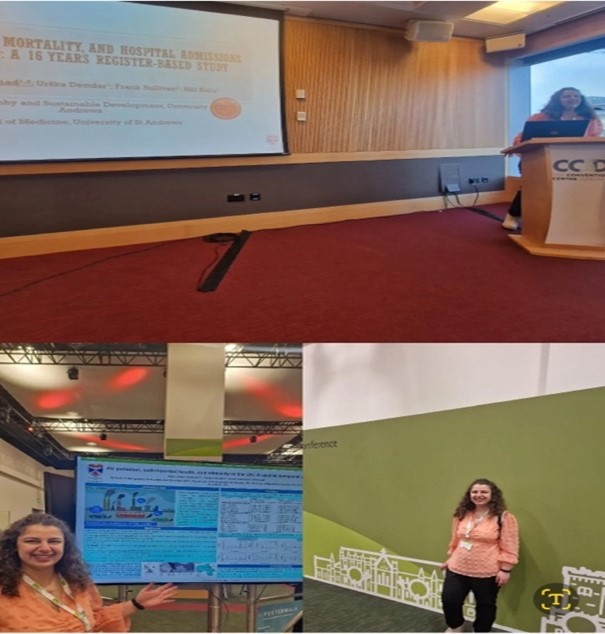
-
Between the 29th of July and the 5th of August 2023, I participated in the Universal Congress of Esperanto in Torino, Italy. While the congress fee was deducted by the congress organisers in exchange for my contribution in the programmation of the event and volunteering with some tasks, the costs of travel and accommodation remained high, and thankfully the Interdisciplinary PhD Research and Travel Fund helped to partially cover them, making possible my participation in the congress.
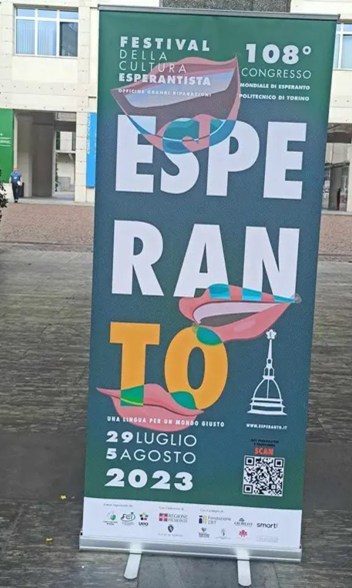
The Universal Congress of Esperanto is of utmost importance for me as an esperantologist. My PhD research deals with Esperanto Millennials in historical and anthropological perspective, and while much of my research data could be gathered during the pandemic through digital fieldwork, the congresses of Esperanto are an essential place to make connections with Esperantists and to learn from the various-themed talks organised throughout the week of the event. The Universal Congress of Esperanto counts also with the Esperantological Conference and with the International Congress University, enabling connection with worldwide experts. Overall, the congress in Italy had more than 1300 registered participants, being one of the biggest Esperanto congresses in recent years.
The key theme of the congress was ‘Immigration, confluence of human values’. This was of particular interest for me because of my previous Master studies in Intercultural Mediation, dealing with mobilities, identities, and conflicts. I was invited to contribute to the discussion, and I delivered a presentation based on my volunteering experience with Roma children that I conducted during my Master studies. It was very interesting for me to engage with panelists and speakers working on similar topics.
A major advantage of participating in the congress was putting my Esperanto linguistics abilities to use. As a constructed language spoken worldwide, but sparsely, Esperanto offers little possibility of extensive communication on a daily basis, with the exception of the Universal Congresses and a few other events. For an esperantologist, the mastery of the language is essential, in order to analyse archival material, to consult literature on esperanto studies, or to conduct interviews. Being fully immersed in the language on the occasion of Universal Congresses allows me to become fully confident about my linguistic skills, and also to understand references and dynamics inside the Esperanto community. Participation in congresses is highly valued in the community for acquiring linguistic capital, but also for building trust with potential informants: Esperantists are more willing to participate in my research when they have previously talked with me or seen me as a contributor in the event, which is a form of retribution to the community. I am not into hit-and-run ethnography, so for me it is crucial to maintain the relations with the Esperantists and to reciprocate for their help with my PhD project, which I consider I have accomplished though my participation in the 2023 congress in Torino.
I am highly grateful to the University of St Andrews for offering me the interdisciplinary award, and I remain at your disposal for any information needed.”
-
My travel to the 21st Congress of the International Union for Quaternary Research (INQUA) was made possible by the Interdisciplinary PhD Research & Travel Fund from the Graduate School of Interdisciplinary Studies. At the INQUA Congress, I attended talks and posters pre
senting exciting new science, had valuable face-to-face meetings with international collaborators, and made new connections for potential future projects.
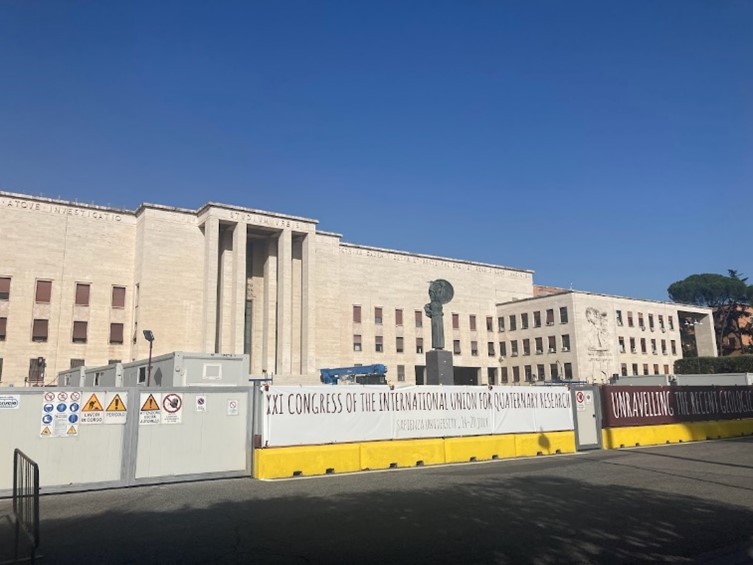
The mission of INQUA is to promote international collaboration on research concerning the Quaternary period (the most recent chapter of Earth’s history, comprising the last ~2.6 million years). Besides researchers from the fields of archaeology, geology, and palaeontology, a strong turnout of paleo-climatologists and paleoceanographers like myself also attended. I had many fruitful meetings as a result. Most notably, I had dinner with an editor I know at the journal Nature Geoscience (a very good connection to upkeep), and I had several meetings with a post-doc from the University of Cambridge who I met at a conference next year and with whom I am now planning to co-convene a session at the next European Geophysical Union (EGU) meeting! I made new connections as well, which resulted in invitations to give my INQUA talk at the British Antarctic Survey (my top-choice of institution at which to do a post-doc) and to spend a few months at the University of New South Wales, Australia, learning how to run complex Earth system models (a skill that would greatly complement the modelling proficiency I’ve developed so far).
Meeting only once every four years, INQUA also holds a special appeal that draws all the best and most-advanced science to its meetings. In the context of the ice ages (the study area of my PhD), I witnessed many new exciting fields and questions emerging from the talks I attended. For example, Daansgard-Oeschger events (events of rapid but short warming during a long-term trend of cooling during an ice age) were a hot-topic – their cause is as-of-yet unknown, but many exciting theories were proposed, with various data to back them up. There was also some healthy scientific debate, as accompanies any good conference. For instance, a major circulation in the Atlantic – the Atlantic Meridional Overturning Circulation or “AMOC” – has canonically been believed to have been weaker and much shallower during the ice ages, however for the first time at this conference I heard some scientists push back on the idea of it being weaker, citing that more definitive data is needed to conclude this. It was fascinating to be at the forefront of human knowledge in this way – to be included amongst discussions for which we still don’t know the right answer!
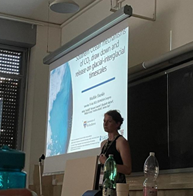
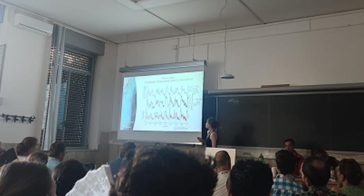
As for my own science, I presented two talks at this conference – one presenting a large dataset I have collected over my PhD that records the changing physical and chemical characteristics of the deep Indian Ocean over the last ice age, and one presenting preliminary results from a modelling study I am conducting to test a new hypothesis of ice-age Atlantic circulation. The first talk was went well and resulted in the previously mentioned invitation to give it at the British Antarctic Survey. The second talk went even better, sparking much discussion during the questions session after. I’m happy to report I found myself being easily able to defend the choices and study design I had made, and I also gathered several new ideas to pursue in future model runs, which was extremely helpful.
It was majorly advantageous getting to present both talks at INQUA as the first talk made the community aware to keep an eye out for a paper on my Indian Ocean data set I hope to publish soon, and the second talk prompted many new ideas to help round-out my modelling study. It is for reasons like these attending conferences are so helpful, especially to early-career researchers like myself, who often need such platforms from which to promote their science and introduce themselves as researchers to the wider community. As already mentioned, besides getting feedback on my science a number of fruitful connections were also made at this conference that will directly benefit my PhD and budding career, such as giving a talk at the British Antarctic Survey, convening a session at another later conference, and visiting a collaborator in Australia to learn new modelling skills. All of this wouldn’t have been possible without the Interdisciplinary PhD Research & Travel Fund from the Graduate School of Interdisciplinary Studies, and for that I am extremely grateful.”